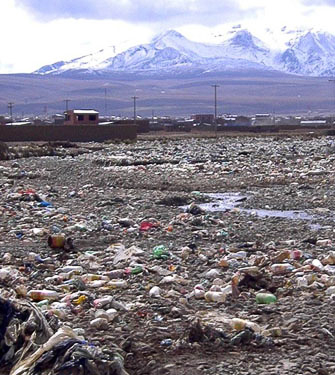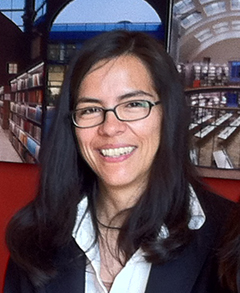Research Maps Policy, Technology Path for Bolivian Biogas
RESEARCH NEWS
KTH researchers work with local partners to help the Bolivian cities of La Paz and El Alto develop strategies for biogas recovery from organic waste. The technical, social and economic challenges are daunting, but solving them could reduce the Andean nation’s heavy costs for energy subsidies and at the same time avert a looming shortage in landfill capacity.

Like many other large cities all over the world, the Bolivian capital La Paz and its rapidly sprawling suburb El Alto are running out of room to put their municipal waste. La Paz is limited by topography: the mountains surrounding the city make it hard for planners to find new landfill sites. El Alto, once a bedroom community but now a major city in its own right, spreads over a dry plain even higher in the Andes, where there’s more room but also stiff local opposition to any proposed waste disposal facility.
With a total population of about 1.8 million, the two cities generate nearly 1000 tons of solid waste every day, well over half of which is made up of organic material that could theoretically be converted through microbial digestion into fuels for heating, cooking, transportation and electricity generation.
Less waste, less pollution, lower carbon emissions and a substantial supply of cheap, domestically produced energy. What could possibly stand in the way?
Plenty, as it turns out. Well-intentioned programmes that hold down energy and utility costs for middle-class and poor Bolivians have the unintended effect of shielding consumers from paying the real costs of both waste disposal and energy use. Even if effective technology can make biogas a cheaper alternative to conventional fuels in head-to-head competition, subsidies mean that a range of inefficiencies look attractive—and a serious attack on price supports could be a nightmare for the nation’s politicians.

“Bolivia produces a lot of natural gas, and energy exports are an important source of income. But that income has also made it possible to give domestic consumers very low prices,” says Cecilia Espinosa of La Paz’s Centre for Promotion of Sustainable Technology (Centro de Promoción de Tecnologías Sostenibles, CPTS). “We pay only about one-fourth of the market price for gas. At the same time, most households pay for waste disposal as a proportion of their electricity bill, so the municipality is paying for a subsidy and people see no reason to reduce their waste.”
The Municipality of La Paz and CPTS, a veteran Bolivian environmental organisation, have found partners in far-off Scandinavia to help develop a viable technological and economic case for biogas production as an alternative to more landfills that no one wants as neighbours. Funded by an initial grant of nearly €500,000 from the Helsinki-based Nordic Climate Facility, the Waste-to-Biogas in Bolivia (WABB) project brings KTH researchers together with Mälardalen University and the waste management and recycling company VafabMiljö, both based in Västerås, Sweden.
A number of differing technical solutions are available for commercial biogas production, which typically involves processing organic wastes or energy crops in anaerobic digesters to make a methane-rich, combustible gas suitable for a wide range of uses. Biogas is generally considered an environmentally preferable alternative to traditional fossil fuels such as coal and oil because it produces little air pollution and doesn’t add to the atmospheric carbon load.
Sweden is recognised as an international leader in converting fleet vehicles to run on biogas and KTH is at the forefront of research in the field, co-ordinating the 26-member European BRISK consortium studying improved production methods for biofuels and thermal biomass conversion. Financed by €11 million in EU research funds, the BRISK project emphasises international mobility, inviting students and professors to conduct experiments at dozens of specialised testing facilities across Europe (See BRISK Accepting Proposals for Biofuels Research ).
The first phase of the WABB project, now nearing completion, is a study of the composition of the region’s solid waste, which will provide a basis for feasibility studies to determine the most suitable technical solution. Next year, the project will conduct a social and policy analysis intended to help policymakers understand the consequences of subsidy reforms.

“WABB is taking a multidisciplinary approach to a complex problem,” says researcher Tomas Lönnqvist. “We’re putting together a package of technical and institutional proposals covering waste management, digester technology and policy adjustments that will help Bolivian officials in their decision-making.” Lönnqvist works in the KTH Division of Energy and Climate Studies, supervised by Professor Semida Silveira.
In late 2010, Bolivian President Evo Morales issued a decree cancelling heavy subsidies on imported gasoline and diesel fuel, citing widespread smuggling of low-cost fuels to neighbouring countries. But prices immediately spiked by as much as 70 per cent, and widespread protests forced the Morales government to back down. CPTS’s Espinosa says the WABB project aims to help chart a more politically palatable course by showing how biogas can support policies aimed at reducing fuel subsidies over time.
“It may be an almost impossible mission to eliminate subsidies,” she says. “We have to find alternatives to reduce the heavy costs of these subsidies, and renewable energy produced from waste constitutes one such alternative. The WABB project is dealing with the challenge of identifying the best strategy for biogas to compete with subsidised fuels.”
By Kevin Billinghurst | kb2@kth.se